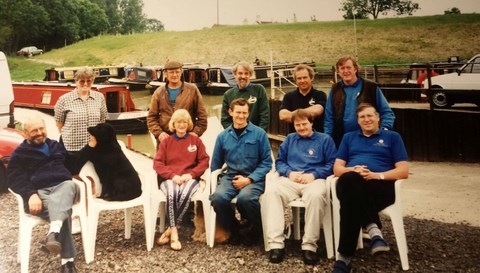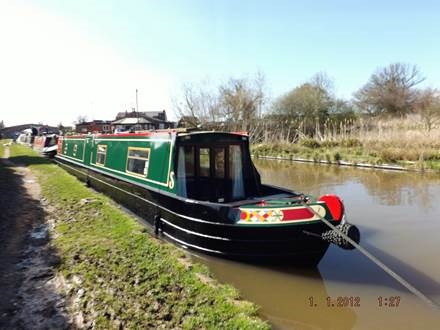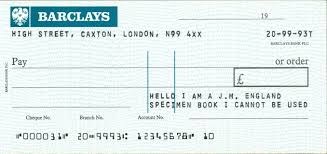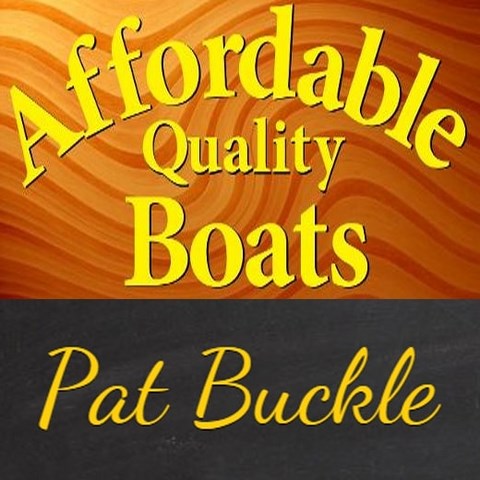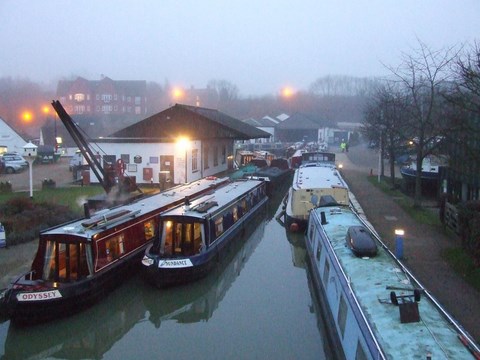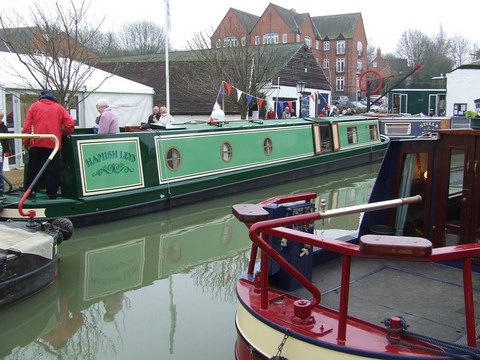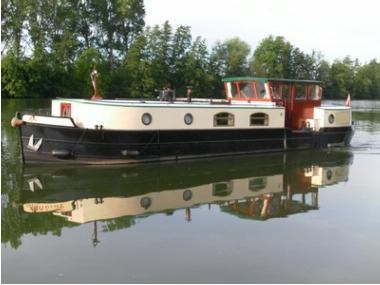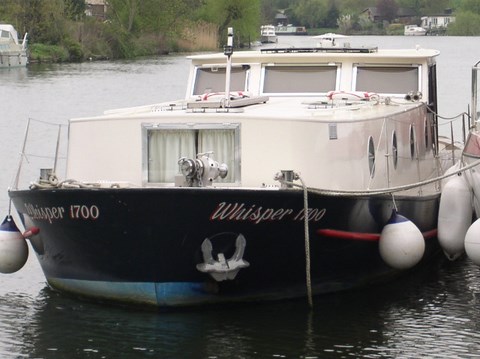The full story on one page
And so it was that in June 1995 I started work at OwnerShips with the grand title of "General Manager", leaving in August 2003. I had no idea what I was letting myself in for!
The OwnerShips "office" was actually the dining room of a rented house in Bounds Green in North London. I was living in Ruislip and soon realised my drive to work to start at 9 a.m. meant leaving my home in Ruislip at 7 a.m. and very soon my hours were changed to a start time of 10 a.m. and a finish of 6 p.m. to try and avoid the traffic, even so my journey home each night was a nightmare. Alongside this on a Friday I was to work from Blue Lias Marina near Southam, a round trip of 168 miles. Sometimes this was quicker than the 16 miles to the office along the Western Avenue (A40) and North Circular Road (A406). The "Office" consisted of two desks, a large photocopier and some filing cabinets and other filing places. Boxes of paper for the copier went anywhere they could be fitted, but more often than not on the piano in the hall. Allen Matthews (MD) lived in the rest of the house.
In the picture above, back row L-R Barbara Payne (cleaning services) Chalkie White (Marina Caretaker) Dave Cowton (Repairs) Guy Sherratt (Repairs) Allen Matthews (MD) front row Pat Buckle (Boat Building) Pat's Dog, Margaret Cowton, Peter Borshick (Diesel Engineer) Philip Duerden (General Manager) Phil Capp (Sales). These were the staff in 1995. Barbara Payne, Guy Sherratt, Allen Matthews and Phil Capp remained associated with the company in some way until the bitter end.
On my desk was a very basic computer which actually ran only DOS programmes but as I, at this time, had few computer skills anything was better than the electric typewriter I had seen as "advance technology" to date.
By way of background here I started my working life at 16 with Nat West Bank, working in branch banking and dealing with the public. It was an inauspicious career and I had slowly worked my way up to Manager's Clerk, where I had ended actually running the branch more or less as my "boss" was an alcoholic and often absent, so when an appointment had been made for somebody to see him for a loan they got me instead as he was never there! I loaned money, lots of it, by "the seat of my pants" and actually was OK at it, we had few bad debts and the branch was making a handsome profit when I left, and I left because I was not happy with my massive workload and the fact that banks were moving in the the age of "Credit scoring" and I was being asked more and more to "sell" banks services. All in all I hated it, time for a change.
By way of background here I started my working life at 16 with Nat West Bank, working in branch banking and dealing with the public. It was an inauspicious career and I had slowly worked my way up to Manager's Clerk, where I had ended actually running the branch more or less as my "boss" was an alcoholic and often absent, so when an appointment had been made for somebody to see him for a loan they got me instead as he was never there! I loaned money, lots of it, by "the seat of my pants" and actually was OK at it, we had few bad debts and the branch was making a handsome profit when I left, and I left because I was not happy with my massive workload and the fact that banks were moving in the the age of "Credit scoring" and I was being asked more and more to "sell" banks services. All in all I hated it, time for a change.
So I left to pursue another dream, to live on a narrow boat and travel the canals. I never forget the day I made that decision. I was in a minibus being taken to a new thing Nat West were setting up, Nat West Home Loans, in Birmingham, yes Nat West were going to offer mortgages! So here I m in this minibus with 11 "over enthusiastic" souls getting excited about this new venture going along the M6 and I look over to my left and see the canal in a early morning mist, and going along it is a boat, all alone, this boat in the mist and nothing else. At that point I decided it was going to be me sometime soon.
I lived on a boat for around six years, and never returned to Nat West, my next job was in retail selling TV's, Hi Fi etc., another passion in my life. I was mad about my music and my hi fi. While working there I set up a 12 volt section so aiming for boaters and those with caravans and one day a certain Allen Matthews walked in to buy a television set having seen an advert....and the rest is history.
I lived on a boat for around six years, and never returned to Nat West, my next job was in retail selling TV's, Hi Fi etc., another passion in my life. I was mad about my music and my hi fi. While working there I set up a 12 volt section so aiming for boaters and those with caravans and one day a certain Allen Matthews walked in to buy a television set having seen an advert....and the rest is history.
So, back to OwnerShips. Allen had "poached" me away from my job in retail with an offer of a salary that far outstripped what I was earning there. I had questioned if he could afford it, he said it was "not a problem" (I subsequently realised this was an answer Allen used a lot). There were 17 boats in the scheme at this time which generated, by my maths, having asked Allen how much management fees each paid, around £51,000 and that left enough left over to run the office after paying me. Allen paid himself a commission on the sales of shares and from that paid the rent for the house and, he assured me, the office overheads were not that great. Apart from the photocopier which was rented and paper for it there were no vast expenses. Furthermore new boats would be coming on at the rate of around six a year so the office income would increase anyway fairly rapidly. As a business model it sounded OK to me so off I went.
It did not take me long to realise all was not well, not well at all. Firstly I quickly realised the company could NOT afford to pay me the promised salary but by putting all my miles though as "expenses" using my own car we could at least reduce the tax and N.I. contribution, and to be fair I did do a heck of a lot of driving at my own expense so I felt is was justified (and indeed a PAYE inspection some years later concurred with my way of doing it).
The next thing to hit me was a little thing called the "Free Services Scheme" and this will get mentioned a lot here, a heck of a lot, for it was this that eventually lead to the downfall of OwnerShips. Remember the name, The Free Services Scheme, I will return to this subject very soon.
The next thing to hit me was a little thing called the "Free Services Scheme" and this will get mentioned a lot here, a heck of a lot, for it was this that eventually lead to the downfall of OwnerShips. Remember the name, The Free Services Scheme, I will return to this subject very soon.
It would perhaps be a good idea here to outline how the business was structured. There were actually three people who worked for OwnerShips, Allen Matthews, myself and Phil Capp (PC) who lived in Manchester and was involved in sales. The business was split in two, OwnerShips Ltd ran the boats, ran the office and paid me. Allen Matthews (Trading as) OwnerShips was Allen himself and where his commission on sales went, this was his income and as he rented the house it paid for that, the gas, electric bills etc. and paid for his personal car. Of course it also paid for his day to day living expenses.
PC was a commission agent and was paid £100 for every share sold. His roll was simple. Allen received an enquiry and mailed out an information pack, Allen then passed over the details of this to PC who then, a week or so later followed up each enquiry to see if they were interested in taking it further, usually calling out in the evenings when people were more likely to be at home. There was no hard sell. PC had no idea what went on in the office really and the only time he ever came in to contact with me (and Allen) was at shows and launch days (he did work in the office for a year much later on in this saga).
There were three main bank accounts. OwnerShips Limited, Allen Matthews trading as OwnerShips and the now infamous Client 2 Account (Client 1 was a small account used for deposits). Remember the name Client 2, it will become important!
The payments went like this. Mr England wants to buy a share, it costs, in simplistic figures, £4,150 so with 12 owners to a boat it meant the boat was sold in shares for £49,000, but actually the boat only cost Allen £36,600, meaning there was an element of profit that worked out as £1,000 per share for Allen and £100 for Phil. It is a sound business model on paper.
The payments went like this. Mr England wants to buy a share, it costs, in simplistic figures, £4,150 so with 12 owners to a boat it meant the boat was sold in shares for £49,000, but actually the boat only cost Allen £36,600, meaning there was an element of profit that worked out as £1,000 per share for Allen and £100 for Phil. It is a sound business model on paper.
The boats were built at Stibbington Boatyard by P M Buckle. Well actually they were not, for sure they were built there but much like Allen taking a commission on each share, so P M Buckle took a commission on each boat, the boats themselves were actually built by a group of men who were what one might call a "workers co-operative". It went like this. The 12 customers each paid a sum of money in to the Client 2 account for their share, out of this account each week the boat yard would phone up for cheques for "wages" and "materials" (and for each boat we had to pay the people directly who made the steelwork). Also Allen would take a commission for each sale, and we paid PC his £100 per share.
So all Allen had to do at the end of each boat, once all the shares were sold was add up the cost of the boat against the money coming in and as long as the money in equalled money out and it all balanced he could start again on the next boat with a clean sheet. Sadly that never happened. The whole thing was a mess. The boatyard were asking for wages and materials against the wrong boats and sometimes boats were wildly over budget (this was the case most times) and sometimes under. No bank reconciliations were ever done and as it was deemed "Clients money" it was never audited by anyone. Furthermore as people were asked to pay for their shares some months in advance of them actually being built the money sent in for a boat in three months time was, in reality, being used to pay for a boat in build now! Because of the overspends Allen found himself running out of (other people's) money.
So all Allen had to do at the end of each boat, once all the shares were sold was add up the cost of the boat against the money coming in and as long as the money in equalled money out and it all balanced he could start again on the next boat with a clean sheet. Sadly that never happened. The whole thing was a mess. The boatyard were asking for wages and materials against the wrong boats and sometimes boats were wildly over budget (this was the case most times) and sometimes under. No bank reconciliations were ever done and as it was deemed "Clients money" it was never audited by anyone. Furthermore as people were asked to pay for their shares some months in advance of them actually being built the money sent in for a boat in three months time was, in reality, being used to pay for a boat in build now! Because of the overspends Allen found himself running out of (other people's) money.

Long before I arrived at OwnerShips Allen set up the "Free Services Scheme" something that ultimately would lead to the downfall of the company and to lots of people losing money. It went like this.
Client 2 account (that paid for the boats) was short of money. For sure not every share in every boat sold prior to it being built, so there was that shortfall to bridge but equally with no handle on exactly why there was no money there Allen just needed some "Cash Flow", and a fair but of it, boats are expensive. No bank would loan the company money at the level needed as he had no security he could put up. He was in a pickle. A chance conversation with an owner on SERENITY lead to Allen setting up what became known as "The Free Services Scheme". It went like this.
Client 2 account (that paid for the boats) was short of money. For sure not every share in every boat sold prior to it being built, so there was that shortfall to bridge but equally with no handle on exactly why there was no money there Allen just needed some "Cash Flow", and a fair but of it, boats are expensive. No bank would loan the company money at the level needed as he had no security he could put up. He was in a pickle. A chance conversation with an owner on SERENITY lead to Allen setting up what became known as "The Free Services Scheme". It went like this.
Customers paid a sum of around £250 each per annum to OwnerShips Ltd for their Management Charge. The deal was if you LEND OwnerShips £2,500 which it will only ever use to fund this hiatus in the funds while building boats, then OwnerShips will waive this fee. I made this a return of around 10% so it was a "no brainer". Customers could have their £2,500 back when they sold their share or in January each year if they asked for it (as the company was "Cash Rich" in January so could fund the return). This offer was "Only available to a limited number of customers" where in fact it was available to just about anyone who applied and the only ones turned down were those who Allen thought might ask "Difficult" questions.
This offer of course seriously depleted the money coming in to OwnerShips Ltd (the account to pay my wages and run the office) and whereas at the start of each year we were OK come September it always looked a bit bleak....so customers were then offered a discount if they paid their management fees early...still further depleting the office income. It was like running fast to stand still.

Of course with all this money flooding in at £2,500 a pop Allen was suddenly cash rich. Well he was not, but the Client 2 Account now was, so there was no stress and no pressure on him. Not only no pressure if shares did not sell, but with so much money sloshing around no pressure on him to see why the money kept on running out.
But then something changed. I arrived to this scenario and I was horrified at what I found. Allen now had somebody on the inside asking "Difficult" questions...
But then something changed. I arrived to this scenario and I was horrified at what I found. Allen now had somebody on the inside asking "Difficult" questions...

I arrived with a background in banking and retail. But I was no businessman, I had never set up a business, nor run a business. I had a heck of a lot to learn and I learned fast. I had previously worked in retail with one of the most astute businessmen I have (still) ever met. Allen was somewhat less so. For sure he was brilliant with people and at marketing but some of his business ideas were very wide of the mark, especially when it came to money!
There was so much wrong that I actually cannot remember what order I tried to sort it out in, but the one thing I did discover was the "Books" for the Client 2 Account, the one that builds the boats, had not been written up, let alone agreed to any bank account, for around four YEARS. They were un-audited, it was a "Clients Account" after all...really? OK so I will live with that title, not much I can do about it, but really they needed writing up to see where the money had gone.
There was so much wrong that I actually cannot remember what order I tried to sort it out in, but the one thing I did discover was the "Books" for the Client 2 Account, the one that builds the boats, had not been written up, let alone agreed to any bank account, for around four YEARS. They were un-audited, it was a "Clients Account" after all...really? OK so I will live with that title, not much I can do about it, but really they needed writing up to see where the money had gone.
They had been started in a Collins Accounts Book (accounting software really did not exist) so I carried on with them. I kid you not when I say that twice a week I would go to the pub local to home find a quiet corner and over a pint or two write up a few cheque books full of accounts. The publican even moved pubs and I moved with him, books and all.

After a few months I had them written up. Now came to try to reconcile them to the bank account, it was impossible, but what I did do was tot up how much money Allen had lost over the years on the boats (funded by the free services scheme) and it came to, as I recall, about £150,000. That became known as "The Hole" and we agreed that The Hole needed filling somehow. The first thing I suggested was that as Allen was not making anything like £1,000 a share his commission should be halved. So I was suggesting to my boss he halve his income. OK he suggested. It did not last. So the only other option is to increase the price of the shares and make more "Profit". Of course being a Cleints account you are not allowed to trade from it, but there was no option. I would use the extra profit to plug the "hole" in each earlier boat builds (I recall the loss showing on ODYSSEY was in the region of £20,000 alone).

Not too long after I arrived at OwnerShips we got some new computers installed. A network, no less, of two. They ran under something called Windows 3.1 and had colour monitors. This was fairly groundbreaking (it actually was!). On to these computers some accounting software called Quickbooks was installed, and suddenly I had some control over the banking and how to run it.
Now you have to understand here that I was not really very computer literate, but given my job was on the line I had every reason to learn and fast!
I continued to write up the books in the ledgers until an agreed date and then we were to start with the accounting software on a boat by boat basis. I also wrote a "dummy" account to represent "The Hole" and where we showed a profit on a boat moved money in to it to represent our "filling" it and thus each boat build came to nil. But it was an inexact science as when a boat was first commissioned the Client 2 account would pay for any "snagging" and then Allen would produce invoices from ages back for items he had bought for a boat, so a nice profit suddenly became a theoretical loss, and more dummy entries were required.
Now you have to understand here that I was not really very computer literate, but given my job was on the line I had every reason to learn and fast!
I continued to write up the books in the ledgers until an agreed date and then we were to start with the accounting software on a boat by boat basis. I also wrote a "dummy" account to represent "The Hole" and where we showed a profit on a boat moved money in to it to represent our "filling" it and thus each boat build came to nil. But it was an inexact science as when a boat was first commissioned the Client 2 account would pay for any "snagging" and then Allen would produce invoices from ages back for items he had bought for a boat, so a nice profit suddenly became a theoretical loss, and more dummy entries were required.
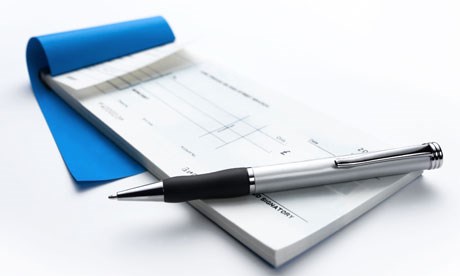
Now, enough of all this. What about the boat bank accounts (or Sinking Funds)? Now here I have a confession to make, I cannot remember if on my arrival these were previously written up in a hand written ledger or if Allen ran some basic information on a PC, what I can tell you is that whatever system was employed there was no reconciliation.
Owners paid two cheques to OwnerShips, "Boat Costs" (say £750 to pluck a figure from the air) and "OwnerShips Costs" say £250. The boat costs were paid in to the boat bank account and the OwnerShips costs went to the limited company. Out of the boat costs came the licence, the mooring fees, the insurance etc. and any running repairs, breakdowns etc. Now you can imagine with 17 boats in the (ever growing) fleet there were a lot of bank accounts and a lot of cheque books. Noting was ever agreed. Owners were presented with a set of figures at their annual meeting each year bore no resemblance to the true figure. There was no fraud going on here, just stuff got missed along the way and so the figure showing as in the bank was nonsense, and if mistakes were found Allen just carried over the "difference" from year to year, as that was the easy solution.
Owners paid two cheques to OwnerShips, "Boat Costs" (say £750 to pluck a figure from the air) and "OwnerShips Costs" say £250. The boat costs were paid in to the boat bank account and the OwnerShips costs went to the limited company. Out of the boat costs came the licence, the mooring fees, the insurance etc. and any running repairs, breakdowns etc. Now you can imagine with 17 boats in the (ever growing) fleet there were a lot of bank accounts and a lot of cheque books. Noting was ever agreed. Owners were presented with a set of figures at their annual meeting each year bore no resemblance to the true figure. There was no fraud going on here, just stuff got missed along the way and so the figure showing as in the bank was nonsense, and if mistakes were found Allen just carried over the "difference" from year to year, as that was the easy solution.
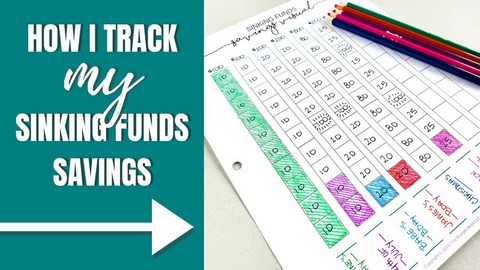
I was not happy with this as I was in effect accountable. We had now got some accounting software and I was very keen to at least get this aspect of the financials under control, after all I was signing the cheques! So, boat by boat I sat down and worked something out. Allen was a bit worried as it actually meant going to the customers and admitting year on year they were presented with something misleading but I said we had no option but to bite the bullet, which we did. Some groups were hundreds better off, some much worse off. The one I recall struggling with the most was ORCHID, they were, somehow, £2,000 better off than we had told them. Our bank manager had a share in this boat.
So there we were with something at least in order, the "Sinking Funds" and as I was responsible I could sleep at night. As the fleet grew so the number of bank accounts grew, I ended up with nearly 100 cheque books! Allen (and others) suggested with the new software we could run one bank account with separate "columns" for each boat. I was dead against this, I wanted little, accountable, pockets of money. It stayed like this until I left.
So, to review. I had not long been in the job. I had managed to balance up to the bank accounts each of the hitherto un-reconciled boat sinking funds and discovered that there was a "Hole" in Client 2 account to the tune of around £150,000 which had been funded by the "Free Services Scheme" to the tune of around £250,000 taking income of £31,250 away from the company this year, and every year.
I took the view that actually the company should survive without this income and anyway the number of boats paying management would be increasing by six boats each year, so whilst it might be tight this year, next year there would be another £18,000 coming in,and again the year after that. As for the hole well now there was a tighter grip on the cost of the boats against what was coming in it would be possible to balance out each boat to nil, where any surplus could be used to plug the shortfall AND actually to some extent it did not matter, well it did but the business could just carry this shortfall and slowly slowly plug the gap as long as there was not a "run" on the money in the Free Services Scheme. Who knows maybe in five years (30 boats later) we might be OK.
I took the view that actually the company should survive without this income and anyway the number of boats paying management would be increasing by six boats each year, so whilst it might be tight this year, next year there would be another £18,000 coming in,and again the year after that. As for the hole well now there was a tighter grip on the cost of the boats against what was coming in it would be possible to balance out each boat to nil, where any surplus could be used to plug the shortfall AND actually to some extent it did not matter, well it did but the business could just carry this shortfall and slowly slowly plug the gap as long as there was not a "run" on the money in the Free Services Scheme. Who knows maybe in five years (30 boats later) we might be OK.
However, there was one problem that did matter, and it mattered a lot. While boats were being built the owners made stage payments according to their contract. But in reality, because of unsold shares in existing boats, and "The Hole", whilst a person paying for their share in three months time was paying well in advance, the money sent in by them was actually being used to pay for a boat being built TODAY. This meant that is was very much hand to mouth still and more importantly OwnerShips could NOT stop building new boats, or the chickens would come home to roost. This was worrying.
To make matters worse almost all of this was NOT my "side" of the office. I was existing boats and boat management, so I was always treading on eggshells when I brought it up. After all what boss likes to be told by the office junior that they have done it all wrong, when that junior had no experience in doing it right.
As if divine intervention Allen gave me something else to have nightmares over and shift my focus. Wet exhausts. Never heard of them? No neither had I....until now.
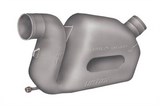
Allen in his marketing had claimed he was offering "virtually silent boating". A claim he could not have a hope of getting, but he was certainly going to try! SOVEREIGN was to be the guinea pig, or so I thought, but how I was wrong.
The boat was fitted with a BMC 1.8 engine (Taxi lump to you and me) which was not that quiet, but a lot of the noise was from the exhaust. Get rid of that and insulate the deck boards and you might be on to a winner. So that was what was done. Insulating deck boards was easy, but in order to get rid of the exhaust noise you had to rapidly cool the gases and then put the fumes out through a efficient, plastic, silencer. To cool the gases you get the water from the canal and mix it with the exhaust gases. You see these exhausts on small boats up and down the coast often sitting there gurgling away. What could go wrong. Well everything as it turns out.
Sovereign was first to have it done. Taken up the slipway at Calcutt it had a mud box fitted on the outside of the hull with holes drilled in it, this acted as a "coarse" filter for the water, this water was then pulled in using an impeller driven pump that had to be fitted running off the alternator pulley. The water was first sucked in to a fine filter, then went to the pump which pushed it in to a plastic waterlock with the exhaust gases mixed in and then pushed up to the plastic silencer and out in to the canal. It worked. Silent boating....well nearly.
So SOVEREIGN had it done and I turned to Allen and said "Right, lets see how that works and maybe later we can do some others if we have no problems with it". I was concerned as there was a lot to go wrong. But no, the others were being done as soon as they came over from Stibbington for those already in build and by P M Buckle's men for those not started. From memory is was around 20 boats that had them fitted. They were a disaster of the highest order. A nightmare.
As if to add insult to injury was that the Client 2 account paid for these, the retro fits on around 4 boats were about £2,000 a time, and the new builts cost around £1,000 extra in parts etc. Was it factored in, was it heck?
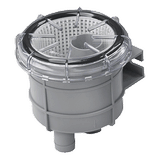
There were many problems but the main once was the fine filter, the owners were supposed to clean it out every morning AND keep an eye at all times to make sure water was coming out the exhaust port. Sadly this was not always the case. The result was an almighty cloud of steam and a very expensive call out. The (now melted) twin-lock alone was about £300 and then you had to find one (they were mainly used on sea going boats, but the sea does not have weed about like a canal) and find somebody to fit it. Repair bills nearing £700 were not uncommon. The owners when presented with the facts at the owners meetings were not at all happy, many citing that they never wanted the wet exhaust in the first place. I was looking after maintenance and I was faced with these terrible things along with all the other "usual" problems. Allen took the view that they were told to make sure there was water coming out of the exhaust at all times, if they did not it was down to them. It caused many arguments at owners meetings.

The solution to balancing this desire for "silent" boating and not having something that failed every third time is was used...well more or less...was something called The Hospital Silencer. What is annoying is they had been around for years, I have just never heard of them until a trip to Reading Marine when I was looking for mooring sites and they showed me over a boat and I asked about it, as they fitted them their boats. Basically is is the same as a normal car silencer but a lot lot bigger (fatter). They were designed to use on hospital generators, hence the name.
We bought one in to try from T W Marine and the rest is history. It did make the engine bays a bit tight and the owners paid for the work on their own boats but the end of the wet exhausts was in sight. We started with new builts getting these silencers and then the owners elected to have them "retro fitted".
We bought one in to try from T W Marine and the rest is history. It did make the engine bays a bit tight and the owners paid for the work on their own boats but the end of the wet exhausts was in sight. We started with new builts getting these silencers and then the owners elected to have them "retro fitted".

So, some months in to my new position and I was updating the books down the pub and doing all the other things that came along and then it came to "Owners Meetings", something new for me to experience! During my first two years these were held at The Crossroads Hotel in Weedon (near the Grand Union, some owners came by boat!) latterly they moved to The Great Barr Hotel in Birmingham, if only because they had more meeting rooms.
In general the logistics of it all were done by Allen, and to be fair he did a terrific job in doing them from start to end. Owners were charged a modest sum for use of the meeting rooms and their lunch and actually we turned a small profit on that but in turn it paid for the bedrooms and meals for myself and Allen (and any other staff that needed to stay over) and we just about broke even on them.
Generally they were quite enjoyable. Owners would ask me (or one of the team) if we could do this or that to their boat and we would either say yes, or say yes but if you do this will happen, or we would say no, that is silly. Mostly we said yes and generally the modifications were not too radical. One or two owners were "interesting" to deal with and liked to throw their weight around but most were fine. We knew who the trouble makers were believe me!
In general the logistics of it all were done by Allen, and to be fair he did a terrific job in doing them from start to end. Owners were charged a modest sum for use of the meeting rooms and their lunch and actually we turned a small profit on that but in turn it paid for the bedrooms and meals for myself and Allen (and any other staff that needed to stay over) and we just about broke even on them.
Generally they were quite enjoyable. Owners would ask me (or one of the team) if we could do this or that to their boat and we would either say yes, or say yes but if you do this will happen, or we would say no, that is silly. Mostly we said yes and generally the modifications were not too radical. One or two owners were "interesting" to deal with and liked to throw their weight around but most were fine. We knew who the trouble makers were believe me!
We would pass the time in the afternoons waiting to be "called" to either answer questions or "Close the meeting" in the bar, all the staff together, so it was generally quite agreeable....but by the time you were on weekend number six trust me it did get a bit wearing. Each set of meetings generated an enormous amount to work to get type up, and the target was to have it done before the next lot started, or you were forever playing catch up. Sometimes we would agree to doing a job which then turned out to be impossible...that then became interesting!
One of my "jobs" at the meetings was to talk about the dreaded "Leaves around the pop" problem you get in the autumn, it became a running gag and almost passed in to folklore.
One of my "jobs" at the meetings was to talk about the dreaded "Leaves around the pop" problem you get in the autumn, it became a running gag and almost passed in to folklore.
After the owners meetings we enter the period known as Winter Maintenance. This was where the work really started. Allen organised the logistics of the dry dock but most of the rest of it fell on my shoulders. It was a total nightmare trying to get boats in the right place and jobs done all around the boat being periodically booked out with customers. Twice I managed to screw it up and double booked a boat, I was mortified I can tell you (although one instance I really blame on the group at the meeting who assured me they had the booking chart with them and it turns out one owner was not at the meeting and had already booked the boat....always check the original chart is the lesson to be learned there).
The team at Brauston that did the work were brilliant and equally so those at Acton Bridge. Sadly some were less so. When I complained that one yard had painted the boat totally the wrong colour and I wanted it repainted before I was prepared to pay them they locked not only that boat but other O/S boats to the moorings using padlocks so nobody could go out. The first I knew of this was when a party taking out a totally different boat turned up to take it out and couldn't. We did not go there again....
The team at Brauston that did the work were brilliant and equally so those at Acton Bridge. Sadly some were less so. When I complained that one yard had painted the boat totally the wrong colour and I wanted it repainted before I was prepared to pay them they locked not only that boat but other O/S boats to the moorings using padlocks so nobody could go out. The first I knew of this was when a party taking out a totally different boat turned up to take it out and couldn't. We did not go there again....
About three quarters of the way through the winter maintenance came the Annual OwnerShips show, which was initially held at Blue Lias Marina but from my arrival was moved to Braunston. Allen organised this and again did a brilliant job doing it, my roll on the day was to "Manage The Show" while he and Phil Capp spoke to potential customers.
Allen enlisted the help of loads of owners to "staff" the day cherry picking the ones who he knew would be great, and they were. The nicest man in the world, Hamish Leys, would come down from Scotland early and get boats from Blue Lias Marina over to Brauston ahead of the weekend and Allen drew up a chart showing where each one had to go. Sometimes once in position he changed his mind and people played "Musical Boats". Sometimes it was fun, often those moving them were less than pleased!
The show was held in a large marquee which was hired in (pictured maybe in the shot of the dry dock above) and we also hired in a bar and Bernie and a team did some catering. They were ALL brilliant. On the Saturday night all those that wanted to would go to the pub down the road where the volunteers were treated to a meal on OwnerShips. On the face of it an expensive treat costing several hundred pounds but you could not get staff for two days for anything like as little as that much, so it worked out.

When I started with OwnerShips there were around 25 boats in the scheme, by the time we reach around 45 boat is was decided that we needed more staff. I am not sure where the position was advertised but I suspect it was at a local job centre and we somehow managed to hit the jackpot first time with Catherine. Catherine had this amazing "Can Do" attitude and took to OwnerShips like a duck to water. I cannot praise her highly enough. She worked with us for the four days a week when were in the office and came and helped out at shows occasionally.
Of course with only two desks in the small office we had to relocate and so we did....to the larger front room in the house, where the back room was given over then to filing and the rather large photocopier etc. Allen's "living room" went upstairs in to the front bedroom of the three bedroom house.
Catherine stayed with us for three years and I rue the day she left, and following on from her were a succession of people who never came up to her standard or when they did elected to leave anyway, until Elaine joined us, and more about her later. Some of the interims lasted a matter of a few days, one lasted three months and actually her work was not bad but her attendance was shocking. She seemed to attract problems, some of which were probably fiction. The best was when her car was hit by a bus on her way to work which resulted in a day off, when she arrived the next day she came in the same car and it looked undamaged! It seems it had clipped a door mirror which needed pushing back on. She also had days off due to a man in the flats where she lived hanging around and speaking to her, headaches, period pains you name it. Eventually after three and months purely based on her attendance not her work we fired her.
Of course with only two desks in the small office we had to relocate and so we did....to the larger front room in the house, where the back room was given over then to filing and the rather large photocopier etc. Allen's "living room" went upstairs in to the front bedroom of the three bedroom house.
Catherine stayed with us for three years and I rue the day she left, and following on from her were a succession of people who never came up to her standard or when they did elected to leave anyway, until Elaine joined us, and more about her later. Some of the interims lasted a matter of a few days, one lasted three months and actually her work was not bad but her attendance was shocking. She seemed to attract problems, some of which were probably fiction. The best was when her car was hit by a bus on her way to work which resulted in a day off, when she arrived the next day she came in the same car and it looked undamaged! It seems it had clipped a door mirror which needed pushing back on. She also had days off due to a man in the flats where she lived hanging around and speaking to her, headaches, period pains you name it. Eventually after three and months purely based on her attendance not her work we fired her.

Whereas I was always one for judicious spending and I looked to try and save money Allen was quite the opposite and certainly never seemed to worry about where the next meal was coming from. A good example of this was his dalliance with classic Rover cars. When I arrived Allen has an old Rover P6 which I recall had belonged to his father and a VW Camper Van. The van was his main transport. It was dropping in bits but when it needed a new engine Allen never hesitated and one was put in by the local garage. I suggested just getting rid of it and buying a Transit van or the likes but Allen would hear none of it, saying they were becoming quite collectable, and he was right of course, today they are, but the only thing collecting on this one was rust. Anyway a new engine was bought but sadly the van was written off in an accident when Allen loaned it to Guy our "go to man for boat repairs". (It was replaced later by a very similar one that caught fire I am advised.)
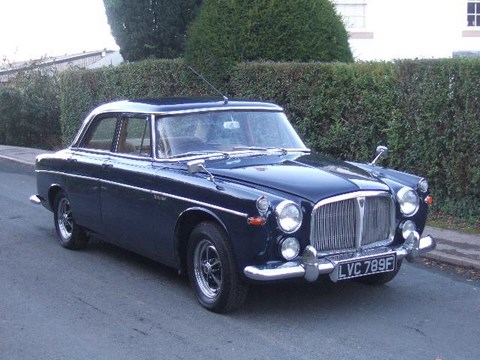
Now the old brown Rover P6 was somewhat clapped out so that was got rid of and replaced by another one bought from a owner of a share I recall, it did not last long before, I think, a head gasket went. I pointed out to Allen that these were the sort of cars owned by enthusiasts and not somebody who was not really mechanically minded but it cut no ice and it was replaced by a Rover P5 in dark blue. He had not had it long when myself, Allen and Guy had to make a trip the Mirfield in Yorkshire to talk to Heron Boats who were going to build HARLEQUIN for us. Allen came to pick me up in the Rover and said he had a terrible headache and could I drive? Reluctantly I agreed to do the 300 mile round trip. I have to confess the car was nice to look at but horrible to drive. It tended to wander in lane on the motorway and the brakes were almost non-existant! Anyway, we survived the trip, Allen then had the front seats re-upholstered as a cost of I do not know what and then the car died with some major mechanical fault and that was the end of that.
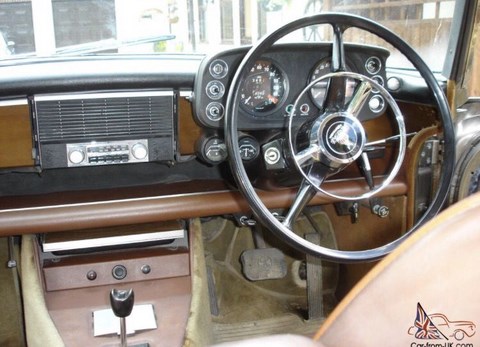
The next, and final Rover in this saga was an even older P5 and in a two tone grey. It was stunning and had clearly been somebodys pride and joy. I have no idea what he paid for it, no idea at all, but it looked to be worth every penny. Allen drove it up to Braunston for the boat show there a few weeks after he got it. On the M1 a water leak developed and by the time it arrived at Braunston there was steam and a loud banging coming from the engine, and that was the end of that.
Thereafter Allen drove large fairly new Volvo estate cars, a much better choice of transport!
In 1996 we had a severe water shortage on the canals and Allen began to worry we might have no business if there was no water and so decided to look further afield for boating options. In 1992 on the back cover of OwnerSnips (an excellent internal magazine for Owners) a wide beam Penichette styled boat had been mooted and had never got of the planning stage, but this time Allen wanted to take it to fruition. I was mortified. We had no money, let alone enough money to built barges costing £60,000+ each. There were to be four barges, one in Ireland, one on the Thames, one in France and a narrow beam one on the canals. Owners buying in could exchange weeks between each one. On paper it sounded fabulous but my job was hard enough trying to manage boats in the UK, but add France and Ireland in the mix AND the lack of money and....well you can guess how I felt.Allen countered this by saying I would have nothing to deal with in the boats in Ireland or France, he would deal with them.
The first boat was to be for Ireland, DERRINEEL and to be built by Pat Buckle. It has to be said that whilst it lacked any classic lines externally, internally it was beautiful, a real floating country cottage. Initially after build it went on to the Thames for testing and it was discovered it did not steer too well, indeed it was a bit of a brick as it had been built with a flat bottom so it went almost as well sideways as forwards. Also as you steered from a wheel in the centre you had no idea where the rudder was pointing, and as the steering was hydraulic you could not even put a marker on the wheel for "middle". A rudder position indicator was needed. Not a easy job but it was done, and it lasted about ten minutes. OK, so the Thames is a fast flowing river and the Shannon Erne waterway in Ireland was a series of canals linking some large lakes (loughs) together and more forgiving so off to Ireland it went. Of course moving things this big does not come cheap....
The first boat was to be for Ireland, DERRINEEL and to be built by Pat Buckle. It has to be said that whilst it lacked any classic lines externally, internally it was beautiful, a real floating country cottage. Initially after build it went on to the Thames for testing and it was discovered it did not steer too well, indeed it was a bit of a brick as it had been built with a flat bottom so it went almost as well sideways as forwards. Also as you steered from a wheel in the centre you had no idea where the rudder was pointing, and as the steering was hydraulic you could not even put a marker on the wheel for "middle". A rudder position indicator was needed. Not a easy job but it was done, and it lasted about ten minutes. OK, so the Thames is a fast flowing river and the Shannon Erne waterway in Ireland was a series of canals linking some large lakes (loughs) together and more forgiving so off to Ireland it went. Of course moving things this big does not come cheap....
The second barge to be built was for France and called Digione. This too was built by Pat Buckle and as it was well in build before the problems with Derrineel and the steering were picked up on it too suffers from the same steering issues.
Allen decided to shift production to Simon Piper who had been building barges for several years and next came DORNEY that was to be the boat for the Thames. The was a V-Bottomed boat and steered like a dream. Subsequent barges were DECIZE, DORCHESTER and DONJEUX. Dorchester ended up being the barge on the Thames as Dorney ended up in France with Donjeux which was always destined to be there.
Derrineel in Ireland did not sell. With only about four shares sold, it was decided it too would have to go to France where there was a demand for shares. It was shipped from Ireland to England where it appeared in the February OwnerShips show and then transported to France. I think the cost of shipping it alone came to £14,000. More that the total profit we SHOULD have made on the whole boat with all shares sold. The losses made on these boats would be eye-watering if worked out, but they would pale in to insignificance compared to the losses yet to come on the ill-fated, and ill conceived, Derwent, the narrow beam Dutch Barge for the UK canals.
Derrineel in Ireland did not sell. With only about four shares sold, it was decided it too would have to go to France where there was a demand for shares. It was shipped from Ireland to England where it appeared in the February OwnerShips show and then transported to France. I think the cost of shipping it alone came to £14,000. More that the total profit we SHOULD have made on the whole boat with all shares sold. The losses made on these boats would be eye-watering if worked out, but they would pale in to insignificance compared to the losses yet to come on the ill-fated, and ill conceived, Derwent, the narrow beam Dutch Barge for the UK canals.
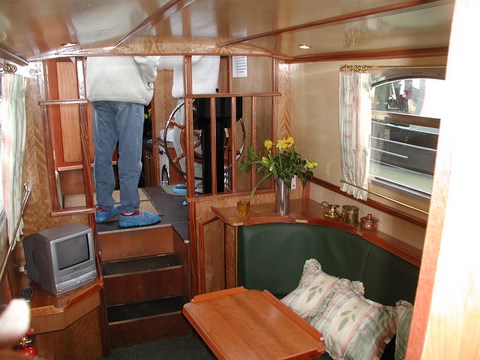
Derwent, built by Simon Piper, was an unmitigated disaster. It was meant to be the "mini flagship" of the barge fleet and sadly was ill conceived from beginning to end. Allen was advised from the off that his plans would not work, mainly by Guy our engineer who said wheel steering on the shallow canals with tight bends did not work, nor Dutch Barge style with wheelhouses, which is why there are so few of them on the inland waterways. Allen thought differently.
At 60' long Derwent had the engine mounted in the bow so the steerer was offered a virtually silent position from which to steer (where have we heard this before, oh yes, wet exhausts). The drive to the propeller at the rear was by way of hydraulic pipes. The boat had a central wheelhouse and a small en-suite cabin at the rear and the saloon forward of the wheelhouse and a double cabin in the bow, again en-suite. I never saw the plans or the boat until it was craned in for our February show at Braunston. I was horrified when I stepped on board. Firstly it felt very cramped and narrow but worse there were no doors from the main cabin out to the wheelhouse. Not so bad in the summer but in the winter it would be freezing, also it was like sharing your living room with your garage as that was where all the "clutter" associated with boating went. Those who looked over it also shared my view. As it turned out this really was the least of the problems but after some modifications (see further down) became the final nail in the coffin.
At 60' long Derwent had the engine mounted in the bow so the steerer was offered a virtually silent position from which to steer (where have we heard this before, oh yes, wet exhausts). The drive to the propeller at the rear was by way of hydraulic pipes. The boat had a central wheelhouse and a small en-suite cabin at the rear and the saloon forward of the wheelhouse and a double cabin in the bow, again en-suite. I never saw the plans or the boat until it was craned in for our February show at Braunston. I was horrified when I stepped on board. Firstly it felt very cramped and narrow but worse there were no doors from the main cabin out to the wheelhouse. Not so bad in the summer but in the winter it would be freezing, also it was like sharing your living room with your garage as that was where all the "clutter" associated with boating went. Those who looked over it also shared my view. As it turned out this really was the least of the problems but after some modifications (see further down) became the final nail in the coffin.
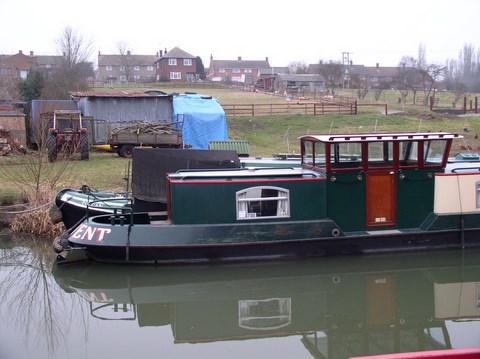
Dewent made the most horrendous noise when underway, a loud singing, almost screaming, noise along the whole length of the hull. The pipes doing the hydraulics were in steel and affixed to the steelwork and this created the most appalling harmonics. The solution was to change them for rubber hydraulic pipes some 50' long along the length of the boat. Quite how safe this was going to be worried me I confess but we never had an issue with them, perhaps because we never had the boat long enough. The pressure in these pipes must have been immense. Had one split the oil coming out would, if it hit you, probably kill you.
Anyway the job was done and the boat entered in to service. The boat had a central wooden wheelhouse which was designed to fit under most bridges and would only need taking down on certain waterways according to the dimensions in the canal guide books. OK here and there it was close but it should fit.
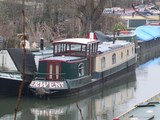
The boat went out with it's first user and returned after a few days with the wheelhouse smashed to smithereens. The customer said that on approaching a bridgehole the boat suddenly slewed and with wheel steering he could not correct it in time and caught the archway. The wheelhouse was rebuilt. The next customer used the boat OK and then a subsequent customer had exactly the same problem and the wheelhouse was wrecked again. It was re-built. Allen decided he wanted to see what happened for himself and took the boat out one wet weekend. He made the mistake of testing it with the wheelhouse UP (it was pouring down) and the wheelhouse was again wrecked. This time it was decided that instead of a wooden wheelhouse a "pram cover" arrangement would be installed as it was faster to take down and cheaper to mend, so this was duly done. This of course meant that when you were in the saloon, with no doors from there to the wheelhouse, you were in little more than a tent and security was now impossible. The customers who owned shares were not impressed and Allen had no option but to refund them and sell the boat. I cannot remember how much it sold for, and I think it ended up on the River Thames, but to say we made some substantial losses on it would be an understatement.
It should be noted that the two shots of the boat above would have been taken after OwnerShips sold the boat and the owners would have put on a wheelhouse that was higher that the one when OwnerShips had the boat.
A footnote to all this saga was that rather than my having nothing to do with the barges as I was assured I ended up in Ireland around four times and France at least twice trying to sort out problems and issues. France was a nightmare even for the smallest things. By example whereas on boats over here hinges and fittings are nearly all brass over there they are stainless steel, so replacing something as small as a hinge becomes a job and a half. Trying to get anything done was just like talking to a brick wall. Still, Auxerre was nice!
Ireland was a joy. The people there had a "craftsman" working for them who was Russian and he spoke no English. He was either ex Russian army or on the run from them, I never did work it out. Egor as I recall. Again getting anything done was fun. A lot of the doors had swelled up and were ill fitting. I had to take them off myself, walk about 1/4 mile to the workshop carrying it, get it trimmed and return and refit it and repeat the process with the next one, in Ireland, in the winter, in the rain....Barges eh? Don't you just love them.
(Footnote: Digione was a private shared boat but I think is no longer deemed as shared)

Of course all the losses on the barges needed to be funded in some way, and so, yes, you guessed it, another round of "Free Management Offers" and another raft of owners, probably around 60 raising £150,000 were called in, costing the company £15,000 a year this year, and every year going forward.
Not put off by the disasters these barges seemingly were proving to be Allen had this pipe dream of living on a wide beam barge on, say, the River Lea (or Lee). He wanted to turn this dream in to a reality and decided the best way forward was to basically built something like it, sell it for a profit and build another and so on, he had found a way to make LOTS of money, The Whisper project was to be the ultimate luxury barge. More about this later...
Office life at OwnerShips was never dull. I (we) never stopped, I often worked well after my normal hours and took work home (or down the pub, see above). I would say to Allen I needed help and his answer was to offer me a pay rise. I said that would not actually be of any help, so always declined, indeed I never took a pay rise in all the time I worked at OwnerShips. Staffing was often an issue, as outlined earlier, but one gem we did manage to find was Elaine.
She and I got on well, both as forthright as each other I suspect! We worked very hard getting all we needed to get done often well over our "normal" hours. By this time Allen had relocated his office to a bedroom upstairs and we kinda kept abreast of what everyone was saying using a baby monitor to hear each other, it was not that successful. One thing crucial in running the office was each one of us being aware of what the other was saying (!). It was no good if Mr X was booking a boat and I knew full well it was either not available as it was stuck the wrong side of a stoppage or whatever, so all knowing what everyone was saying and to whom I felt key, it did not always work but I think we managed to get through it.
She and I got on well, both as forthright as each other I suspect! We worked very hard getting all we needed to get done often well over our "normal" hours. By this time Allen had relocated his office to a bedroom upstairs and we kinda kept abreast of what everyone was saying using a baby monitor to hear each other, it was not that successful. One thing crucial in running the office was each one of us being aware of what the other was saying (!). It was no good if Mr X was booking a boat and I knew full well it was either not available as it was stuck the wrong side of a stoppage or whatever, so all knowing what everyone was saying and to whom I felt key, it did not always work but I think we managed to get through it.
Although helping me with some general office stuff Elaine also was Allen's assistant and prepared contacts and the likes for new customers and processed sales. So my "help" was somewhat diluted and every now and again a "friend" of Allen would turn up and do some filing etc.(See below)
Allen's personal life was something that also affected office life to some extent. Basically Allen really had no male friends at all, quite why I have no idea to this day. He did all the usual things and went to school like anyone else and on to University but there was never any mention of any old school or Uni' friends. He did however have a string of ex-girlfriends whom it seemed he could never quite let go of, so ex-girlfriends became...well friends cum office help cum occasional gardeners!
Something new came along in around 1996 for us, with the new computers we had the Internet and within that Allen decided to try what is known as "Internet Dating" and seemed to have a different "date" almost every night.
He never really cooked at home, he was strictly a frozen meal, a fork and a microwave when he did anything for himself, and I can understand that, but when having a "meal out" he was not heading for the local carvery or McDonalds, he was more your decent restaurant type and not for Allen the house plonk to wash it down, it was always something better than that. So, I guess the ladies he tried to woo were taken with the offer with fine food. Generally I never got to meet these ladies as he saw them in the evenings and why would I? But I did get to see the bills that came in to pay for the meals...
He never really cooked at home, he was strictly a frozen meal, a fork and a microwave when he did anything for himself, and I can understand that, but when having a "meal out" he was not heading for the local carvery or McDonalds, he was more your decent restaurant type and not for Allen the house plonk to wash it down, it was always something better than that. So, I guess the ladies he tried to woo were taken with the offer with fine food. Generally I never got to meet these ladies as he saw them in the evenings and why would I? But I did get to see the bills that came in to pay for the meals...
The was one date he had called Deborah whom he met through the Internet and before long Deborah was pregnant and nine months later Allen had a son; Sam. In true Allen fashion the relationship did not last and they broke up, but of course Allen was still the child's father and so was financially providing for him, and his mother who could not work as she had to look after him. The (eyewatering) monthly sum going out was yet another burden..
Looking back at all the excesses and losses it is a wonder we were still trading as all but with more and more boats coming on stream to pay management fees the company was getting enough money in to prop up all these losses but no thought was ever given to refilling "The Hole" in the Clients account and as long as we were still building boats and people were still paying money out for boats some months ahead, we carried on. As I mentioned earlier the Clients number 2 account was never audited and that is where all these somewhat large losses were hidden.
The next bolt was the afore-mentioned Whisper project. Allen was hell bent on building this boat and when I asked how he was to fund the say £400,000 it would cost to build it he said it was to be from The Free Services Scheme where he tweaked the wording of the agreement so he was "covered" if the owners got wind it was that they had in effect paid for it, something that was actually technically outside of OwnerShips and the signed agreement as it WAS.
So it was that say 160 owners were sucked in at £2,500 each to lending OwnerShips money, which was, alone, robbing the "Office" side of the business £40,000 of income EACH YEAR.
About this time Banks were falling over themselves to lend money and the landlord of the house we were renting in Bounds Green had decided he wanted Allen out and he was going to sell it. Allen decided it would make sense for him to buy it (actually probably a good decision) and Barclays Bank agreed to lend him the money for a mortgage on it. Allen signed up and all that Allen had to do to buy the house for somewhere near £250,000 was to find the 5% deposit. When the request came though for the payment of said deposit, some £11,000, we did not have it. I asked Allen where the money was to come from, he said to take it from the Clients 2 Account but put it through OwnerShips Ltd first or the bank might think it odd. I asked him about how I was to treat the VAT and he said I was to put it though as a VAT free loan to the business.
So it was that say 160 owners were sucked in at £2,500 each to lending OwnerShips money, which was, alone, robbing the "Office" side of the business £40,000 of income EACH YEAR.
About this time Banks were falling over themselves to lend money and the landlord of the house we were renting in Bounds Green had decided he wanted Allen out and he was going to sell it. Allen decided it would make sense for him to buy it (actually probably a good decision) and Barclays Bank agreed to lend him the money for a mortgage on it. Allen signed up and all that Allen had to do to buy the house for somewhere near £250,000 was to find the 5% deposit. When the request came though for the payment of said deposit, some £11,000, we did not have it. I asked Allen where the money was to come from, he said to take it from the Clients 2 Account but put it through OwnerShips Ltd first or the bank might think it odd. I asked him about how I was to treat the VAT and he said I was to put it though as a VAT free loan to the business.
I handed him the cheques to sign, I had signed my last cheque for OwnerShips.
A few days later I handed in my notice.
In a lot of ways it was an easy decision but balanced by great sadness.
In a lot of ways it was an easy decision but balanced by great sadness.
I was a married man with four young children. My wife worked but there was no way we were going to get by on her salary. I found a job selling engine parts from an office cum factory dealing with exports, mainly generator parts, to Africa. It was a terrible place to work and actually there was no job. The company were hopeless "Investor In People" it proudly says on their information. I was "taught" to do my job by a woman who was deported as an illegal immigrant, I actually watched as she was "collected" from the building. They obviously invest in the wrong people, myself included as it turned out. One woman who sat near me had Heart FM on on the radio on her desk all day. When I complained and said it was dreadful and could we at least have Radio 2 sometimes (or even better, nothing) I was told she had worked here longer than me and that was what she had on and I had to grin a bear it. The rest of the office were further way, they could not hear it...
Six months later they got rid of me, I was not surprised, last in first out. They had lost a massive contract to repair gearboxes on London Buses and so had no need for the building and were getting rid of people as cheaply as possible wherever they could....oh and the fact that I was not very good at what I did probably helped them make their decision.
Six months later they got rid of me, I was not surprised, last in first out. They had lost a massive contract to repair gearboxes on London Buses and so had no need for the building and were getting rid of people as cheaply as possible wherever they could....oh and the fact that I was not very good at what I did probably helped them make their decision.
I ended up "On The Dole" for a short period before falling in to a job selling paper in to schools and also running a stationery shop for a several years.
Now I have my own music business putting on bands each week in London. I am very lucky to have ended up where I am now. Very lucky indeed, plus I have proved I can run my own business and I can make a profit!
Now I have my own music business putting on bands each week in London. I am very lucky to have ended up where I am now. Very lucky indeed, plus I have proved I can run my own business and I can make a profit!
Of course I followed events at OwnerShips from the outside with interest, and even attended one of more shows at Brauston. It was nice to see a few faces again. I even went to see Whisper at the boat show in Excel in London, it was superficially at least a magnificent boat. Did the orders pour in, no. Did it sell, yes, at a substantial loss I am lead to believe (Cost £500,000 sold for 112,000 euro I gather). No surprise there then.
The narrow boats continued to be built with production shifting from John Milburn to Poland probably around 2008 in an attempt to generate more profits I suspect, I never did find out why. My understanding is the boats from Poland are OK.
The narrow boats continued to be built with production shifting from John Milburn to Poland probably around 2008 in an attempt to generate more profits I suspect, I never did find out why. My understanding is the boats from Poland are OK.
The final narrow boat was Middlewood in February 2010. Around the same time Allen died from bowel cancer. Some months later those working for the company realised it was bankrupt. A rescue plan was mooted but never happened and it went bust with debts of £1.8 million pounds, when I left, prior to the building of Whisper I would suspected there was a problem of around £150,000, but in re-reading the above it was, post barges and pre-Whisper, nearer £350,000. Of course as unsold shares were eventually moved on the shortfall would reduce this figure, and there was a lot of "Dead Wood" in the barges I suspect. I actually left before all were commissioned, just.
Allen had is seems, towards the end, used all the boat "Sinking Fund" accounts to keep things going and pay wages and dreamt up more fanciful schemes to get money in, a "Buy Back" offer and "Marina Purchase" scheme I have read about, I have no idea what was involved. He also took a personal loan from a friend for £200,000 and it is that person I feel most sorry for. I will mention no names here, but that is a substantial sum to loose and he must have known when taking out the loan he had not a cat in hells chance of paying it back.
Fortunatly when the company went bust no owners lost their shares in the boats (the liquidator did try!) and the total of £1.8 million was well spread other than the loan above. I am sure losing your £2,500 invested was a blow but if you had had it in the scheme for say five years then the actual loss on paper, offset against fees not paid in management costs, meant is was about half that. Enough, but not life changing.
A number of owners had to pay their boat costs (sinking fund contributions) again I gather.
A number of owners had to pay their boat costs (sinking fund contributions) again I gather.
The failure of OwnerShips is to be laid firmly at the feet of one man, Allen Matthews, sadly he is no longer with us. He had a great idea with OwnerShips and had he stuck to it I am sure by now he would be living on his wide beam barge on the River Lea. Sadly all the side projects, funded by other people's money, were his downfall. He was warned, but did he listen? Well he did not listen when he was told the concept of OwnerShips itself would not work by those on the canals when he set it all up back in 1990 and he proved them wrong, maybe he thought he was right all along.
Where to find shares
If you are looking to buy or sell a share, or just want to see what is available, then please visit our sister site here


